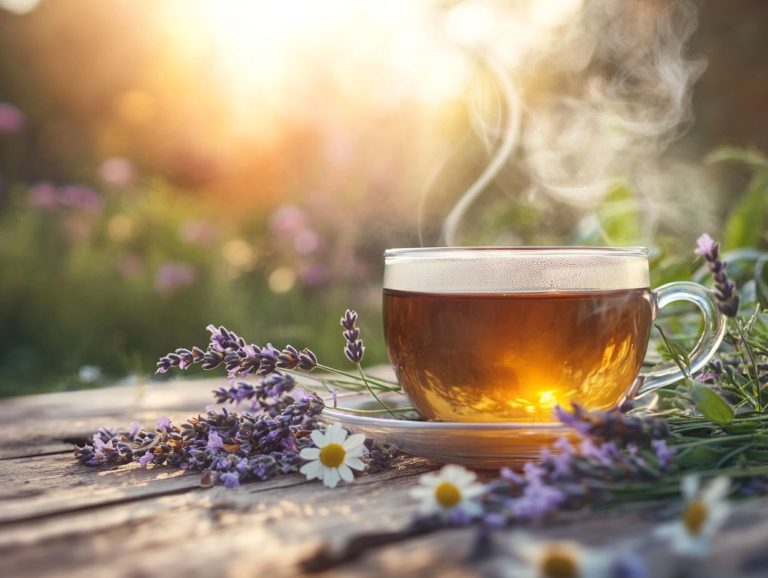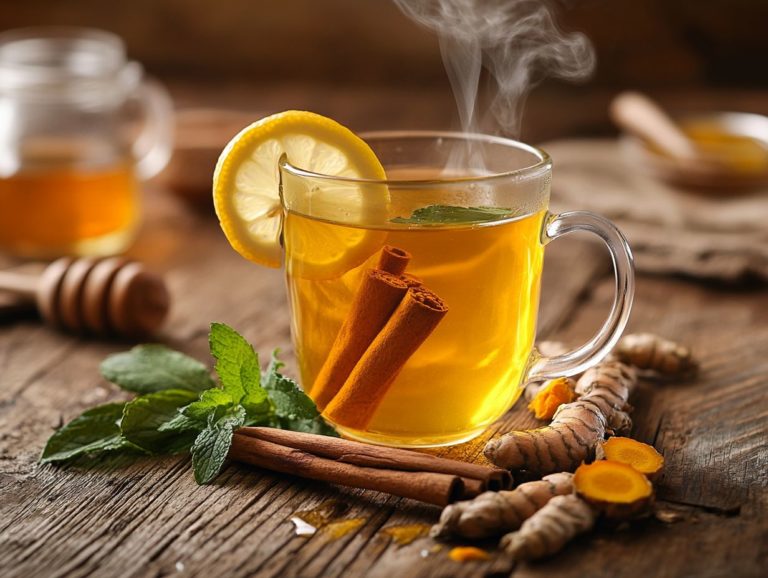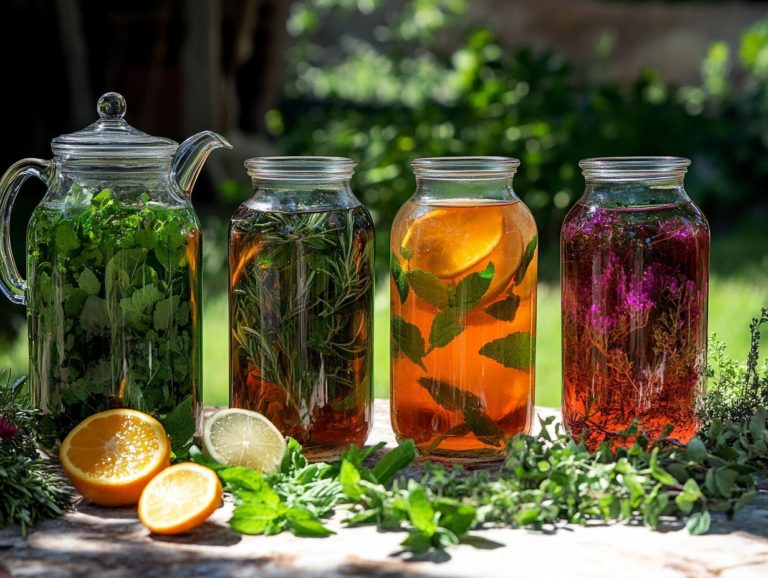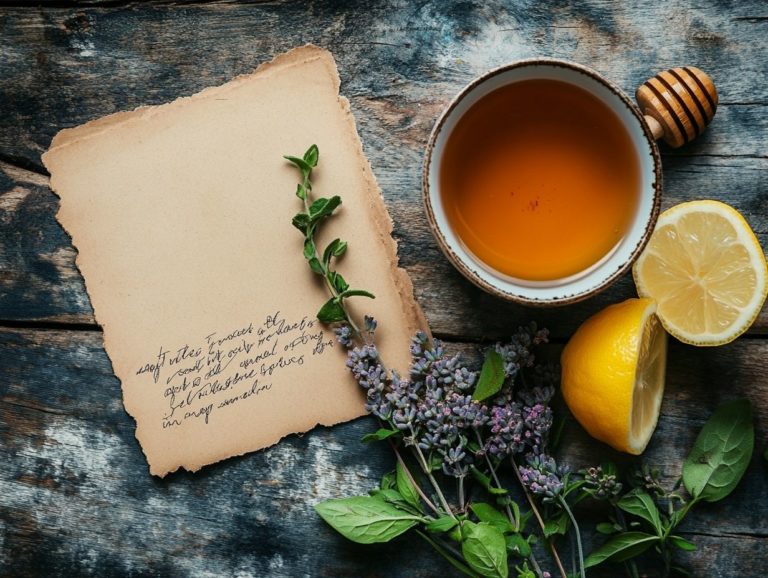5 Herbal Teas for Post-Workout Recovery
Recovering after a workout is just as crucial as the workout itself. Your post-exercise nutrition can significantly impact your recovery process, particularly when you incorporate herbal tea into your routine.
Herbal teas provide a natural and soothing solution for aiding recovery. They are brimming with hydration benefits that help alleviate soreness, reduce inflammation, and replenish your body.
This article delves into five herbal teas chamomile, peppermint, ginger, turmeric, and green tea each possessing unique properties that enhance post-workout recovery. These teas are essential for athletes.
Don t miss out on how these delightful brews can transform your fitness routine, boost your energy, and promote your overall well-being.
Contents
- Key Takeaways:
- 1. Chamomile Tea
- 2. Peppermint Tea
- 3. Ginger Tea
- 4. Turmeric Tea
- 5. Green Tea
- How Do Herbal Teas Aid in Post-Workout Recovery?
- What Are the Benefits of Chamomile Tea for Post-Workout Recovery?
- How Does Peppermint Tea Help with Muscle Soreness?
- What Are the Anti-Inflammatory Properties of Ginger Tea?
- How Can Turmeric Tea Help with Post-Workout Inflammation?
- What Are the Antioxidant Benefits of Green Tea for Post-Workout Recovery?
- Frequently Asked Questions
- 1. What are 5 herbal teas recommended for post-workout recovery?
- 2. How does ginger tea aid in post-workout recovery?
- 3. Can chamomile tea help with muscle relaxation after a workout?
- 4. Is peppermint tea a good choice for post-workout recovery?
- 5. What makes green tea a good post-workout recovery drink?
- 6. How does hibiscus tea aid in post-workout recovery?
Key Takeaways:
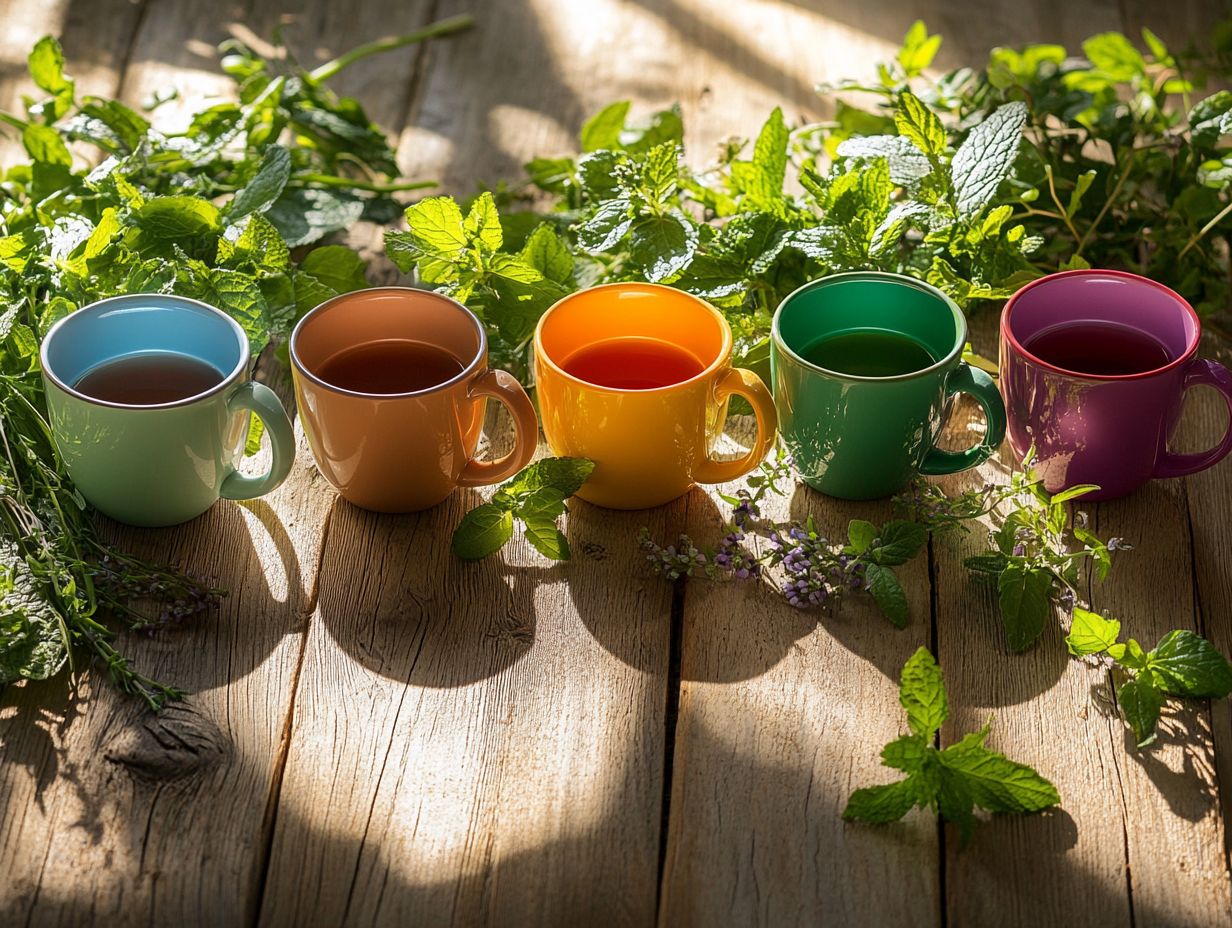
- Chamomile tea can reduce muscle soreness and promote relaxation after a workout, making it a favorite among fitness enthusiasts.
- Peppermint tea can help alleviate muscle soreness, improve digestion, and enhance hydration, aiding in post-workout recovery.
- Ginger tea has properties that can help reduce post-workout inflammation and promote healing, contributing to optimal muscle recovery.
1. Chamomile Tea
Chamomile tea, revered for its soothing qualities, serves as an exceptional herbal remedy that can significantly enhance your post-workout recovery routine. Its antioxidant-rich profile helps reduce soreness and promotes relaxation.
Rich in antioxidants, chamomile tea combats oxidative stress, which is damage caused by free radicals during intense exercise. This tea supports muscle recovery and hydration by minimizing inflammation, making it an ideal choice for rejuvenating your body after strenuous activity. For additional benefits, consider trying 5 herbal tea recipes for a healthy gut.
Numerous studies indicate that chamomile s anti-inflammatory properties help alleviate muscle pain and stiffness. Experts recommend integrating this gentle herbal infusion into your post-workout routine to foster relaxation both mentally and physically, ultimately boosting your performance.
Chamomile tea hydrates you and accelerates recovery, making it a wise choice for fitness enthusiasts looking to elevate their game.
2. Peppermint Tea
Peppermint tea isn t just a refreshing beverage; it s packed with benefits for you as an athlete. It effectively alleviates muscle soreness and enhances hydration, making it a superb choice before and after workouts to elevate your energy and focus.
The soothing properties of peppermint work wonders on tired muscles after exercise. The menthol component can enhance blood circulation, promoting quicker recovery times. Staying well-hydrated is vital for optimal athletic performance, and the 5 best herbal teas for hydration offers a delightful alternative to plain water, making it easier to increase your fluid intake.
This herbal infusion sharpens your mental clarity and focus, essential for maintaining endurance and energy levels during long training sessions. By embracing peppermint tea, you empower yourself to push your limits and achieve your fitness goals.
3. Ginger Tea
Ginger tea is a remarkable herbal drink celebrated for its anti-inflammatory properties, making it an exceptional choice for athletes seeking to accelerate muscle recovery and alleviate post-workout soreness. This invigorating infusion is packed with natural antioxidants and soothing benefits.
Within this spicy brew lies bioactive compounds like gingerol, which can significantly reduce inflammation and muscle pain. Research indicates that integrating ginger tea into your regular post-exercise routine leads to noticeable improvements in recovery times, allowing you to train more effectively with less discomfort. For those interested in expanding their herbal options, consider exploring 5 delightful DIY herbal teas for wellness.
Studies published in the Journal of Pain reveal that athletes who consume ginger experience marked reductions in muscle soreness, underscoring its anti-inflammatory benefits. By weaving herbal tea blends like ginger tea into your regimen, you enhance your recovery process and promote your overall wellness, making it an invaluable addition to your post-exercise ritual.
4. Turmeric Tea

Turmeric tea, infused with the remarkable compound curcumin, stands out for its exceptional anti-inflammatory properties. This makes it a favored choice among athletes seeking post-workout recovery, as it effectively combats inflammation and enhances overall health with its wealth of antioxidants.
Research underscores that curcumin significantly alleviates muscle soreness and speeds up recovery time, enabling you to train more effectively. This colorful drink also boosts hydration, a key element for optimal performance, recovery, and fat burning.
By enhancing nutrient absorption, turmeric tea ensures that your body efficiently utilizes essential vitamins and minerals, further supporting your athletic pursuits. Regular enjoyment of this tea not only aids immediate recovery but may also offer long-term health benefits, such as improved joint function and a reduced risk of chronic inflammation, making it an invaluable addition to your regimen.
5. Green Tea
Green tea is an exceptional beverage rich in antioxidants that not only boosts your metabolism but also provides remarkable benefits for post-workout recovery. It offers a natural energy lift and contains essential polyphenols (a type of antioxidant), like EGCG, that support muscle repair and help you achieve your fitness goals.
With its unique blend of caffeine and catechins, green tea stimulates fat oxidation, enhancing your body s ability to burn fat during exercise. Numerous studies have shown that caffeine can elevate your energy levels, making workouts feel less daunting while also improving your endurance.
The potent antioxidants found in green tea, along with beneficial polyphenols like EGCG, play a vital role in fighting oxidative stress, promoting quicker recovery after those intense training sessions and enhancing your metabolism. By incorporating this beverage into your daily routine, you not only support weight management but also enhance your athletic performance and overall well-being making it a beloved choice among health enthusiasts!
How Do Herbal Teas Aid in Post-Workout Recovery?
Herbal teas like chamomile, ginger, turmeric, peppermint, and green tea are essential allies in your post-workout recovery. They provide vital antioxidants, promote hydration, and help alleviate muscle soreness, ultimately enhancing your performance and supporting your fitness goals.
Each of these teas, including energizing matcha, brings its own unique benefits to your recovery process. Chamomile, renowned for its calming effects, works wonders in reducing inflammation and easing tension in your body, making it perfect for winding down after an intense training session. Ginger, loaded with powerful anti-inflammatory compounds, can effectively ease muscle pain and diminish exercise-induced stress. Then there’s turmeric, boasting curcumin, which combats inflammation and may even enhance your joint health. For an extra boost in the morning, consider trying the best herbal teas for morning boost, making it a low-calorie yet powerful addition to your routine.
Peppermint shines by improving digestion and respiratory function, leaving you feeling rejuvenated. Meanwhile, green tea’s high antioxidant content not only helps reduce oxidative stress but also gives your metabolism a boost, further supporting your recovery and overall health.
Embrace these herbal teas to supercharge your recovery! They will elevate your post-workout routine and contribute significantly to your journey.
What Are the Benefits of Chamomile Tea for Post-Workout Recovery?
Chamomile tea offers remarkable benefits for your post-workout recovery! Its soothing properties foster relaxation, and its abundant antioxidant content alleviates muscle soreness and enhances your overall recovery, making it an excellent option.
Numerous studies support these qualities, revealing that the antioxidants found in chamomile tea, like apigenin, can significantly reduce inflammation. Experts frequently recommend chamomile to enhance sleep quality, a vital component for muscle repair.
Research published in the *Journal of Herbal Medicine* underscores chamomile’s ability to accelerate recovery by promoting both physical and mental relaxation, which is particularly beneficial for athletes. This makes it not just a delightful beverage but also a strategic ally in optimizing your recovery routine! For those looking for more options, consider trying energizing herbal teas for your morning to enhance your wellness journey!
How Does Peppermint Tea Help with Muscle Soreness?

Peppermint tea can be a game-changer for muscle soreness and hydration after workouts. Its natural anti-inflammatory properties promote hydration and provide a refreshing energy boost to help you recover.
Research shows that menthol in peppermint relaxes muscles and improves blood circulation. This leads to quicker recovery times and better performance.
Staying hydrated is crucial for athletes; dehydration can worsen muscle soreness. Peppermint tea not only replenishes fluids but also balances electrolytes, which are important after intense training.
Athletes report noticeable reductions in discomfort from incorporating this soothing beverage into their routines. For a calming experience, try these herbal tea recipes for a relaxing evening. A study in the Journal of Sports Science suggests peppermint’s anti-inflammatory properties may reduce recovery time, making it essential for optimal hydration.
What Are the Anti-Inflammatory Properties of Ginger Tea?
Ginger tea is well-known for its strong anti-inflammatory benefits. It helps lessen post-workout soreness and provides essential antioxidants that support your fitness goals.
The key compounds, gingerol and shogaol, reduce inflammation and oxidative stress, which can hinder performance. Studies show these compounds effectively decrease muscle pain, streamlining recovery after rigorous training.
Ginger tea also enhances circulation, ensuring vital nutrients reach your muscles quickly. This means you’ll experience faster recovery between workouts, boosting your overall performance.
A study published in the Journal of Pain found that participants consuming ginger experienced significant reductions in exercise-induced soreness. This highlights the advantages of adding ginger tea to your post-workout routine.
How Can Turmeric Tea Help with Post-Workout Inflammation?
Turmeric tea is a powerful ally for athletes tackling post-workout inflammation. Its anti-inflammatory properties and antioxidants help with muscle recovery and overall wellness.
Turmeric contains curcumin, a bioactive compound that has been the focus of many studies. Curcumin is effective in reducing inflammation crucial for anyone engaging in intense activities.
Research suggests curcumin can significantly lower inflammation markers in your body. This leads to quicker recovery times and improved athletic performance.
By incorporating turmeric tea into your routine, you might find it easier to bounce back after tough workouts, enhancing your training longevity and maintaining high performance.
What Are the Antioxidant Benefits of Green Tea for Post-Workout Recovery?
Green tea offers a treasure trove of antioxidant benefits that are essential for your post-workout recovery. A compound in green tea called EGCG enhances metabolic function and supports muscle repair, making it a valuable ally for athletes.
Green tea is also rich in other powerful antioxidants such as catechins and flavonoids. These compounds work together harmoniously to reduce inflammation and oxidative stress. Research has shown that they play a pivotal role in alleviating muscle soreness and speeding up healing processes after exercise.
In fact, a study published in the Journal of Nutritional Biochemistry revealed that athletes who regularly consumed green tea enjoyed shorter recovery times and improved performance metrics. This means you could speed up your recovery and boost your endurance and strength, making it an essential part of your nutritional strategy, especially for fat burning. Additionally, incorporating refreshing herbal teas can enhance your hydration and overall wellness, especially on hot days.
Frequently Asked Questions
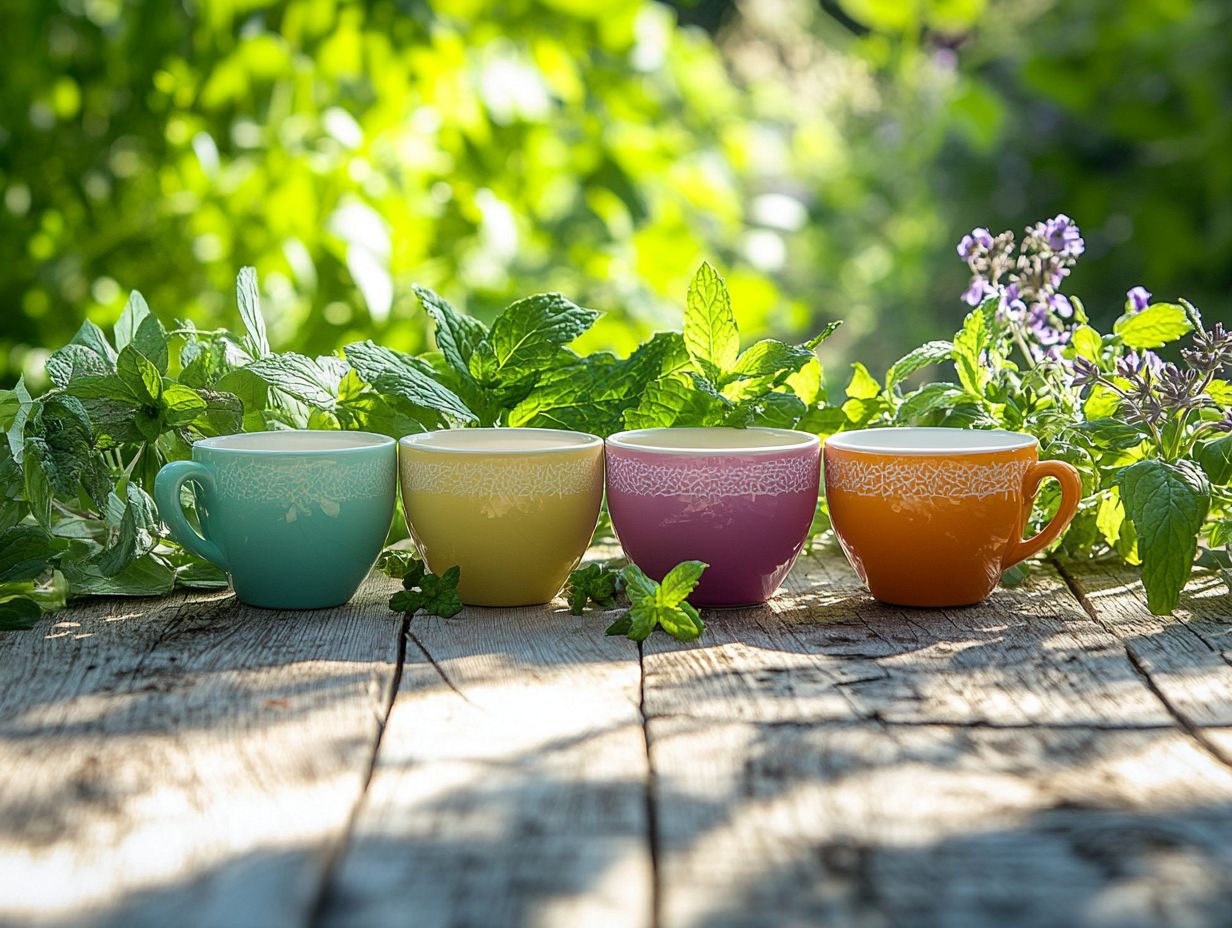
1. What are 5 herbal teas recommended for post-workout recovery?
The five herbal teas recommended for post-workout recovery are ginger tea, chamomile tea, peppermint tea, green tea, and hibiscus tea. Each offers unique health benefits and aids in hydration.
2. How does ginger tea aid in post-workout recovery?
Ginger tea has anti-inflammatory properties that can help reduce muscle soreness and inflammation after a workout, making it a great choice for post-workout recovery.
3. Can chamomile tea help with muscle relaxation after a workout?
Yes, chamomile tea has calming properties that can help relax the muscles and reduce tension, making it beneficial for post-workout recovery.
4. Is peppermint tea a good choice for post-workout recovery?
Yes, peppermint tea has been found to have analgesic properties, which can help alleviate muscle pain and discomfort after a workout.
5. What makes green tea a good post-workout recovery drink?
Green tea contains catechins, which are antioxidants that have been shown to reduce muscle damage and improve muscle recovery after exercise, thanks to their rich content of polyphenols. Polyphenols are plant compounds known for their antioxidant properties.
6. How does hibiscus tea aid in post-workout recovery?
Hibiscus tea has anti-inflammatory properties and is rich in antioxidants, making it a great choice for reducing inflammation and promoting muscle recovery after a workout.


